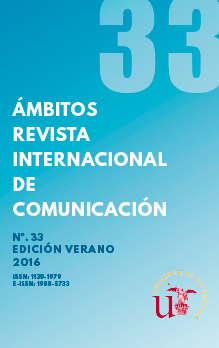Un siglo de cine político mexicano
Keywords:
Cine político, México, régimen autoritario, cineastas, política. Mexican cinema, Mexico, authoritarian regime, filmmakers, mexican politics.Abstract
Este artículo presenta el análisis de todas las películas mexicanas de temática política producidas durante los años de 1910 a 2014. La metodología utilizada consiste en un análisis de contenido de 54 largometrajes para identificar: año de producción, director, género, período y temática política que aborda, y también los premios nacionales e internacionales que recibieron. Los resultados muestran que México cuenta con una importante filmografía y directores que han abordado acontecimientos claves de las transformaciones políticas del país en el último siglo. This paper analyzes the mexican political filmes from 1910 to 2014. The paper studies 54 movies using the a content analysis to determine: production year, filmaker, film genre, political period, theme, and national and international awards won. The conclusions are Mexico has an important films and filmmakers that have addressed key events of political changes in the country in the last century.
Downloads
References
ANUARIO ESTADISTICO DEL CINE MEXICANO (2015): Instituto Mexicano de Cinematografía. México.
AYALA, J. (1986): La búsqueda del cine mexicano. UNAM, México, 1974 [2a ed. Posada, 1986].
_______ (1994): La eficacia del cine mexicano. Grijalbo, México,
CRAWLE, J. (2006): Mr. Sorkin Goes to Washington, Shaping the Presiden ton Television´s The West Wing. North Carolina, MacFarland.
DE LA VEGA, E. y GARCIA TSAO, L. (2011): Historia de la producción cinematográfica mexicana, 19772010. Universidad de Guadalajara. México.
GARCIA RIERA, E. (1992-1997): Historia Documental del cine mexicano. 18 tomos. Universidad de Guadalajara, Consejo Nacional para la Cultura y las Artes (CONACULTA), Secretaría de Cultura del Gobierno del Estado de Jalisco y el Instituto Mexicano de Cinematografía (IMCINE)
___________ (1998):Breve historia del cine mexicano. Primer Siglo 1897-1997, México, Conaculta. Imcine/ Ediciones Mapa/Canal 22/ Universidad de Guadalajara,.
MONSIVAIS, C. (1997): Rostros del cine mexicano. México: Américo Artes Editores S.A de C.V.,
PORRAS, J. (2008): “El cine como instrumento de reinterpretación histórica en periodos de transición democrática”. Ciencias Sociales . Vol. IV. No. 122 pp. 89-101
MONSIVAIS, C. y BONFIL, C. (1994): A través del espejo: el cine mexicano y su público. México: Ediciones El Milagro; Instituto Mexicano de Cinematografía,
MAAREK, P. (1997): Marketing político y comunicación. Barcelona: Paidós.
MORENO BRIZUELA, D. y VÁZQUEZ GOMEZ R. (1983) : “Políticas
Cinematográficas”. UNAM: Escuela de Ciencias Sociales. México D.F
NEGRINE, MANCINI y HOLTZ-BACHA. (2007): The professionalization of Political Communication. Bristol: Intellect.
RODRIGUEZ VIRGILI, J; SÁBADA, T, LÓPEZ HERMIDA, A. (2010): “La ficción audiovisual como nuevo escenario para la Comunicación Política”. CIC Cuadernos de Información y Comunicación, vol. 15 37-54 pp.
RUIZ, A. (2009): “El desarrollo del cine y el videodocumental en la dinámica sociopolítica del México contemporáneo”. En Claves del Pensamiento, vol. III, núm. 6, julio – diciembre, 2009, pp. 153-167 ITESM-Ciudad de México Distrito Federal, México.
VELAZCO, S. (2005): “Rojo amanecer y La ley de Herodes: cine político de la transición política mexicana”. Hispanic Research Journal: Iberian and Latin American Studies. Vo. 6, Issue 1. pp. 67-80.
VIÑAS, M. (1987).:Historia del cine mexicano. UNAM-UNESCO. México.
Downloads
Published
How to Cite
Issue
Section
License
Ámbitos. Revista Internacional de Comunicación is an open access journal, which means that all content is freely available at no charge to the user or their institution. Users may read, download, copy, distribute, distribute, print, search or link to the full text of articles, or use them for any other lawful purpose, without seeking prior permission from the publisher or author. This definition of open access is in accordance with the Budapest Open Access Initiative (BOAI).

Unless otherwise noted, all content in the electronic edition is distributed under a "Creative Commons Attribution-NonCommercial-ShareAlike 4.0 International License". You can consult the informative version and legal text of the licence here. This should be expressly stated in this way where necessary.
In case of acceptance of the manuscript, the authors cede the rights of the work for its publication to Ámbitos. Revista Internacional de Comunicación under the Attribution-NonCommercial-ShareAlike 4.0 International license contract (CC BY-NC-SA 4.0). The authors retain copyright and third parties are authorised to copy, distribute and make use of the work, provided they comply with the terms and conditions set out in the licence
- Cite the authorship and the original source of publication (journal, publisher and URL of the work).
- Do not use them for commercial purposes.
- If you remix, transform or create from the material, you must release your contributions under the same license as the original.
More information can be found at https://creativecommons.org/licenses/by-nc-sa/4.0/deed.es


















